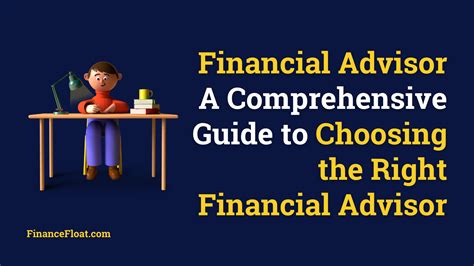

How Do I Choose a Financial Advisor: A Comprehensive Guide
Navigating the Financial Maze with the Right Expert

In today’s complex financial landscape, choosing the right financial advisor can make all the difference in achieving your financial goals. With countless options available, how do you navigate the maze and find the perfect fit for your needs? Here’s a comprehensive guide to help you make an informed decision.
Evaluate Your Needs and Goals
Before embarking on your search, it’s crucial to introspect and determine your specific financial needs and goals. Ask yourself:
- What areas of financial planning do I need assistance with? (e.g., investments, retirement planning, estate planning)
- What is my risk tolerance?
- What are my short-term and long-term financial objectives?
Do Your Research and Due Diligence
Once you’ve defined your requirements, embark on a thorough research journey. Explore credible sources such as:
- Financial Planning Association (FPA): A professional organization with members who meet ethical standards and continuing education requirements.
- National Association of Personal Financial Advisors (NAPFA): A non-profit organization representing fee-only financial advisors.
- Investopedia, Forbes, and The Wall Street Journal: Renowned publications that provide in-depth articles and expert insights on financial planning.
Ask for Referrals and Recommendations
Harness the power of your network. Ask friends, family members, and colleagues who they trust for financial guidance. Personal recommendations can often lead you to reliable and experienced advisors.
Interview Potential Candidates
Don’t settle for the first advisor you come across. Conduct thorough interviews with several candidates to compare their expertise, experience, and fees. Consider the following questions:
- Experience and Qualifications: How long have they been in the industry? What certifications or designations do they hold?
- Investment Philosophy and Methodology: What is their approach to investing? Do they align with your risk tolerance and goals?
- Compensation Structure: How are their services compensated? Are there any hidden fees or commissions?
- Client Communication: How often will they communicate with you? What methods do they use to stay in touch?
Consider Fees and Compensation Structure
- Fee-Only: Advisors charge a flat fee or hourly rate for their services, ensuring an unbiased approach.
- Commission-Based: Advisors receive commissions from investments they recommend. While this model can be cost-effective, it may introduce potential conflicts of interest.
- Fee-Plus-Commission Hybrid: Advisors charge a combination of fees and commissions, offering a balance of both models.
Check for Regulatory Compliance and Background
Verify the advisor’s credentials and regulatory compliance. Check with the Securities and Exchange Commission (SEC) or Financial Industry Regulatory Authority (FINRA) to ensure they are registered and have a clean record.
Common Mistakes to Avoid
- Rushing into a Decision: Take your time and research thoroughly before committing to an advisor.
- Focusing Solely on Fees: While fees are important, they should not be the primary factor in your decision.
- Ignoring Red Flags: If an advisor is pressuring you or refuses to answer your questions honestly, consider it a warning sign.
- Not Communicating Openly: Maintain open communication with your advisor to ensure they fully understand your goals and preferences.
- Neglecting Regular Reviews: Your financial situation and goals evolve over time. Schedule regular check-ins with your advisor to adjust your strategy accordingly.
Tips and Tricks for Choosing the Right Financial Advisor
- Look for Certified Financial Planners (CFPs): This designation signifies a high level of knowledge and ethical standards.
- Consider Fiduciary Advisors: Advisors legally bound to act in their clients’ best interests, even when it conflicts with their own.
- Request Client Testimonials: Ask for references from satisfied clients to gauge the advisor’s track record.
- Check for Awards and Recognition: Advisors who have received awards or industry recognition may indicate a higher level of expertise and professionalism.
- Consider Your Gut Feeling: While it’s important to follow a logical process, trust your instincts and choose an advisor who you feel comfortable with.
Choosing the right financial advisor is a crucial step towards achieving your financial aspirations. By carefully evaluating your needs, conducting thorough research, and avoiding common pitfalls, you can find the perfect partner to guide you on your financial journey. Remember, the decision you make today can have a profound impact on your financial well-being in the years to come.
Additional Tips for Choosing a Financial Advisor
- Consider an Advisor Specializing in Your Age Group: Financial needs and goals shift with age. Choose an advisor who understands the unique challenges and opportunities associated with your life stage.
- Look for Advisors Who Use Financial Planning Software: Technology can streamline the planning process, enhance communication, and ensure your goals stay on track.
- Don’t Be Afraid to Switch Advisors: If you’re not satisfied with your current advisor, don’t hesitate to seek a new one. It’s your money, and you deserve to work with someone you trust and respect.
- Set Up a Regular Review Schedule: Meet with your advisor at least twice a year to review your progress and make necessary adjustments.
Table 1: Types of Financial Advisor Compensation
| Compensation Structure | Description | Pros | Cons |
|---|---|---|---|
| Fee-Only | Advisors charge a flat fee or hourly rate | No conflicts of interest | Can be expensive |
| Commission-Based | Advisors receive commissions from investments they recommend | Cost-effective | Potential conflicts of interest |
| Fee-Plus-Commission Hybrid | Advisors charge a combination of fees and commissions | Balance of both models | Can be more expensive than fee-only |
Table 2: Common Mistakes to Avoid When Choosing a Financial Advisor
| Mistake | Description |
|---|---|
| Rushing into a Decision | Not taking enough time to research and compare candidates |
| Focusing Solely on Fees | Choosing an advisor primarily based on low fees |
| Ignoring Red Flags | Dismissing warning signs about an advisor’s behavior or reputation |
| Not Communicating Openly | Failing to communicate your goals and preferences effectively |
| Neglecting Regular Reviews | Not meeting with your advisor regularly to adjust your strategy |
Table 3: Tips for Choosing the Right Financial Advisor
| Tip | Description |
|---|---|
| Look for Certified Financial Planners (CFPs) | High level of knowledge and ethical standards |
| Consider Fiduciary Advisors | Legally bound to act in their clients’ best interests |
| Request Client Testimonials | Gauge the advisor’s track record |
| Check for Awards and Recognition | Indicates higher level of expertise and professionalism |
| Consider Your Gut Feeling | Choose an advisor who you feel comfortable with |
Table 4: Additional Considerations for Choosing a Financial Advisor
| Consideration | Description |
|---|---|
| Advisor Specializing in Your Age Group | Understands the unique challenges and opportunities associated with your life stage |
| Advisors Using Financial Planning Software | Streamlines the planning process and enhances communication |
| Don’t Be Afraid to Switch Advisors | Seek a new advisor if not satisfied |
| Set Up a Regular Review Schedule | Ensure your goals stay on track |










